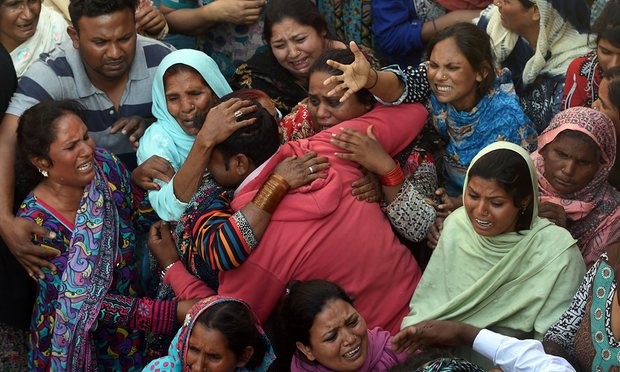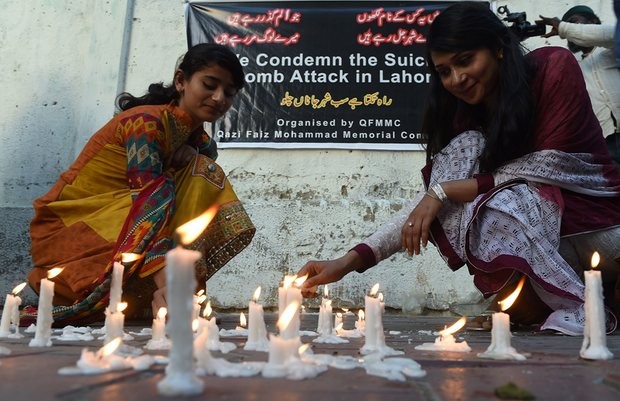Pakistan mourns 70 victims of Easter suicide bomb attack
‘The government has proved it cannot keep people safe,’ says pastor of Christian chapel after scores were killed at amusement park

Waqar Masih could not wait for Easter Sunday to get under way. The nine-year-old boy opted for the earliest possible service of the day – a 3am session of hymns, plays and sermons at the Children’s Chapel in Youhanabad, a ramshackle unpaved slum that is home to one of Lahore’s largest Christian populations.
After a packed day of family events, Waqar slipped off with four friends in the early evening to Gulshan-e-Iqbal, a park 15km away containing fairground rides and food stalls – all accessible for a 5 rupee (3p) entry ticket.
Waqar was standing somewhere between the dodgems and a spaceship ride when a suicide bomb ripped through the crowd of families, killing him and at least
71 other people. More than 200 were injured, with women and children bearing the brunt of the carnage.
Waqar’s father, a 34-year-old mason called Pervez, had told his son not to go. “At the church we have security, but in these public places the government has provided nothing,” he told the Guardian shortly after his son was buried under a sprawling banyan tree at the heart of a Youhanabad cemetery.
The graveyard was so busy on Monday that the smell of smouldering rubbish was temporarily masked by the incense and perfumed flowers laid on the graves of five other young victims of the bomb.
Punjab’s provincial government had laid on extensive security at churches following last March’s deadly Taliban bombings in Youhanabad.
On Sunday, 10 policemen and a dozen private security guards were stationed near the Children’s Chapel, a multistorey building used both as classrooms and a place of worship. But there was just one man checking tickets as people entered the amusement park, a compound surrounded by a low wall.
“The government has proved it cannot keep people safe so the army should take over security,” said Shakil Anjum, the chapel’s 50-year-old pastor. “They have strengthened security at our churches but now terrorists are coming to public spaces to kill us.”
A spokesman for the Taliban splinter group Jamaat-ul-Ahrar said Christians were deliberately targeted.
A large number of Christians – who are among the country’s most economically disadvantaged communities – had been attracted to the cheap and affordable public attraction as an Easter treat for their children.
But there were also plenty of Muslims among the hundreds wounded. Lahore’s overwhelmed hospitals made desperate public appeals for blood donations.
The Punjab government announced three days of mourning as plastic-wrapped bouquets and cards from the prime minister Nawaz Sharif were placed at the bedsides of those in hospital.

Shahbaz Sharif, the chief minister of Punjab and brother of the prime minister, promised compensation payments of 1 million rupees (£6,700) to the families of the dead.
And, significantly, the country’s army announced the arrest of a “number of suspect terrorists and facilitators” and the seizure of a “huge cache of arms and ammunition” during raids across Punjab.
That the military appears to be taking a lead role in the province suggests Punjab’s civilian leaders may have been forced to abandon their long-standing resistance to the Rangers, a paramilitary wing of the army.
The Rangers are leading a crackdown on organised crime and terrorism in the southern city of Karachi, which though successful has proved highly controversial with the city’s main political parties, who claim to have been victimised.
On Monday the least seriously injured survivors were waiting for operations to remove shrapnel and fix broken bones. Among them was Nadeem Gul, a 35-year-old driver, who had been in the dodgems queue with his children when the bomb went off. Although peppered with shrapnel, his two sons escaped unscathed.
“We have had to learn to live with fear,” he said. “Every time there is a religious festival we Christians feel a looming sense of threat. We cannot be happy on our holy occasions.”
An exhausted Pastor Anjum oversaw the burial of six children and teenagers on Monday. Six times, a funeral procession moved through the cramped alleyways of Youhanabad, beginning with a rousing hymn outside the Children’s Chapel.
“I’m not angry,” said Anjum. “I’m just full of despair.”
How to submit an Op-Ed: Libyan Express accepts opinion articles on a wide range of topics. Submissions may be sent to oped@libyanexpress.com. Please include ‘Op-Ed’ in the subject line.
- Libya’s HCS invites applicants for key state roles - December 31, 2023
- UK calls on Iran to prevent escalation in Israel-Hamas conflict - November 05, 2023
- Libyan Interior Minister: Immigrant shelter costs a fortune - November 05, 2023


